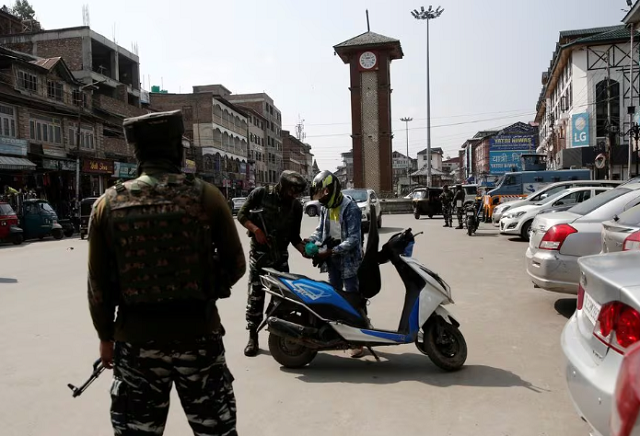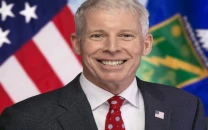Indian SC upholds Modi's suspension of special status to Kashmir
Court observes Article 370 'temporary provision'; orders elections in Indian occupied Kashmir by Sept 2024

The Indian Supreme Court in a unanimous verdict on Monday upheld the Modi government’s 2019 decision to abrogate Article 370, revoking special status to occupied Kashmir, reported The Times of India.
The court directed the election commission to hold elections in the Indian Illegally Occupied Jammu and Kashmir (IIOJK) region by September 30, 2024.
In 2019, the ruling Bharatiya Janata Party (BJP) revoked the special status of occupied Kashmir by abolishing Article 370 of the constitution. Not only did the law reserve state government jobs for residents, as well as college places, in an effort to keep the state from being overrun by people from the rest of India.
This article had further restricted the Indian parliament's authority to enact laws in the region, except in defense, foreign affairs, and communications.
However, the abrogation then enabled people from other parts of India to buy property and settle permanently in Kashmir.
Critics, including Kashmiris, international organisations, and opponents of India's Hindu nationalist-led government, viewed this decision as an attempt to alter the Muslim-majority demographics of Kashmir with Hindu settlers.
The court's direction today was part of the verdict on pleas challenging the revocation of the special status of IlOJK.
A five-member bench, led by Chief Justice of India DY Chandrachud, had reserved its verdict on September 5 regarding whether the move was legal despite lacking the endorsement from parliament usually required for constitutional change.
The unanimous order by a panel of five judges came in response to more than a dozen petitions challenging the revocation and a subsequent decision to split the region into two federally administered territories while, the central government, on the other hand, had defended its action, asserting there was no "constitutional fraud" in nullifying the provision.
Criticism had poured in, claiming that media freedoms and public protests have been significantly curtailed since the decision regarding the legality of the move, with the authorities consolidating control.
Read Kashmir's fate hangs on Indian SC decision
However, Prime Minister Narendra Modi's government had defended the move, asserting that it had brought "peace, progress, and prosperity" to the region.
The decision to uphold the suspension of special status taken today sets the stage for elections in the region, which was more closely integrated with India after the government's contentious move, taken in line with a key longstanding promise of Modi's nationalist Bharatiya Janata Party (BJP).
The judgement is a shot in the arm for the government ahead of general elections due in May.
The challengers had maintained that only the constituent assembly of IIOJK could decide on the special status of the scenic mountain region, and contested whether parliament had the power to revoke it.
The court said special status was a temporary constitutional provision that could be revoked by parliament. It also ordered that the federal territory should return to being a state at the earliest opportunity.
It should be noted that India's only Muslim-majority region, IIOJK has been at the heart of more than 75 years of animosity with neighbouring Pakistan since the birth of the two nations in 1947 at independence from colonial rule by Britain.
The territory is divided among India, which rules the populous Kashmir Valley and the Hindu-dominated region of Jammu, Pakistan, which controls a wedge of territory in the west, and China, which holds a thinly populated high-altitude area in the north.
Series of actions in IIOJK
In 2019, Home Minister Amit Shah had told parliament that the president had signed a decree abolishing Article 370 of the constitution giving special autonomy to the Muslim-majority Himalayan region.
Indian media had said that Occupied Kashmir and Ladakh would now be Union Territory with a legislature.
After the abrogation, Modi had held a security cabinet meeting, hours after his government ordered a lockdown in occupied Kashmir, cutting phone and internet links and putting local politicians under house arrest.
New Delhi had claimed the sweeping clampdown, enforced by tens of thousands of military reinforcements, was needed because of the "prevailing law and order situation".
All phones, internet services and cable networks were snapped at midnight in the region of more than seven million people following days of soaring tensions.
Only residents with a "curfew pass" were allowed on the streets and had ordered thousands of tourists out of occupied Kashmir saying there was a threat of militant attacks.
At the same time in IIOJK, nearly 80,000 paramilitary forces had been flown into Kashmir.
United Nations (UN) expressed concern over India's move
The UN-recognised disputed territory, IIOJK was met with concern in 2019 from the United Nations-Secretary-General who had 'all along' maintained that Pakistan and India should resolve all outstanding disputes between the two countries through dialogue including Kashmir.
The UN Secretary-General Antonio Guterres had also urged the two neighbours to exercise restraint.
Shortly before the abrogation, the UN Military Observer Group in India and Pakistan (UNMOGIP) had also observed and reported an increase in military activities along the Line of Control (LoC).



















COMMENTS
Comments are moderated and generally will be posted if they are on-topic and not abusive.
For more information, please see our Comments FAQ